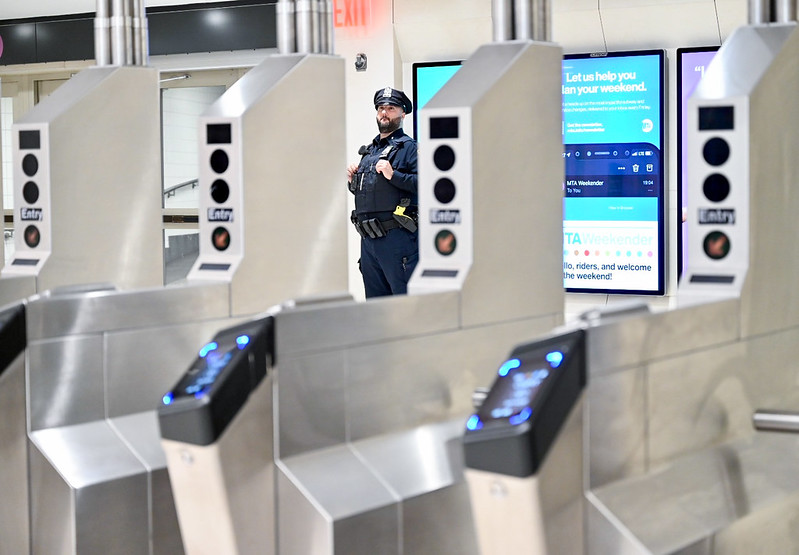“Rather than addressing public safety or cost of living concerns, New York City risks backsliding towards the alarmism of criminalizing the poor.”

Diane Bondareff/Mayoral Photo Office
A police officer in the subway system in 2022.Several weeks ago, a calamity occurred on the subway, made possible by a failed policy that criminalizes commuters instead of addressing their cost of living crisis.
In a span of seconds, four New Yorkers were senselessly shot at the L train subway station, leaving two innocent bystanders in critical condition. This tragedy began when police officers reportedly approached a man who did not pay his subway fare. The release of NYPD body camera footage has done little to quell outrage.
The reality is that this dangerous incident was made possible by a fare evasion enforcement policy that has made our transit system less safe. Instead, it has created chaos that sows distrust with police, all because of a deeply flawed, punitive regime that produces dangerous consequences for civilians and law enforcement alike.
Earlier this year, Mayor Adams announced that hundreds of additional NYPD officers would be sent to the subway system to address fare evasion. More recently, New York City’s bus system has also faced increased fare evasion enforcement.
The mayor argued the heightened police presence would support public safety, linking a crackdown in fare evasion to the reduction in crime in the subways more generally, touting New York City as the safest big city in America in the process.
Despite these claims, recent research has shown no statistically significant associations between fare evasion enforcement and total arrests for other crimes. Rather than addressing public safety or cost of living concerns, New York City risks backsliding towards the alarmism of criminalizing the poor.
This is especially true of low-income communities and communities of color. When compared to the start of the year, summons for fare evasion have increased by 16 percent, with four out of every five summonses made to people of color. Meanwhile, arrests for fare evasion have spiked by a whopping 82 percent, with 94 percent of those who are arrested being people of color, according to our analysis of NYPD fare evasion data.
The Adams administration is misguidedly approaching fare evasion as a crime problem rather than a cost of living problem. At a time when one in five New Yorkers struggle to afford subway and bus fares and transportation costs cause over half of all Americans stress, there is a ready solution in the form of the Fair Fares program, which provides 50 percent discounts to eligible city residents to alleviate transportation costs.
Unfortunately, it is estimated that only 33 percent of the eligible population has enrolled in the program. Which says nothing about those whose incomes are too high to qualify: a New Yorker working full-time at the local minimum wage of $16 per hour earns too much to participate in the program. However, instead of investing additional resources in increasing enrollment and widening the reach of the program, funding is being directed to treat people struggling to pay the cost of a fare as criminals.
If the city’s intent is to increase fare compliance, we call for an alternative approach that focuses on developing and implementing programs to address the structures that cause economic deprivation, rather than criminalizing poverty.
First, in echoing four of New York City’s borough presidents, we are calling to expand eligibility for Fair Fares to 200 percent of the federal poverty level, above the current 120 percent threshold. This will ensure an extra 750,000 adults are eligible for Fair Fares and would cost the city an additional $55 million, assuming the current pattern of usage continues to prevail—just a third of the $151 million the city spent on police overtime for MTA officers in 2023. In the longer term, eligibility for Fare Fares could be tied to the True Cost of Living Measure, which the city is set to adopt.
This increase in eligibility should be accompanied by a promotional campaign to ensure those eligible hear about the program.
Second, we call for an approach where eligible people caught riding without paying are supported to sign up for Fair Fares, rather than handed a fine. As FPWA has long-championed, this would be a people-centered and trauma-informed policy change in stark contrast to the current punishment-focused approach.
Finally, we call on the state legislature to pass a bill and the City Council to pass a resolution in support of the bill that would decriminalize “theft of services” statewide—a misdemeanor charge that is often given to those who are accused of fare evasion.
In a city like New York, where so many of us rely on public transport, we must ensure it is accessible to all. We call on the government to support more people to use and access our subway system, rather than criminalizing them.
Funmi Akinnawonu is a senior policy analyst and Brad Martin is a senior fiscal policy analyst at the Federation of Protestant Welfare Agencies (FPWA).








